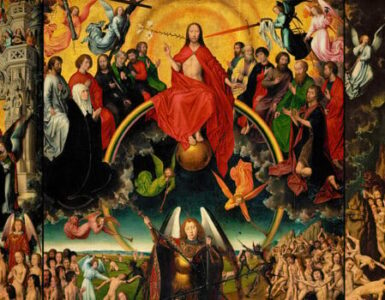On that first day, following the death and burial of Jesus, the disciples did not rush forward into the world. Rather, they returned to the tomb. Sometimes, there is value in taking a step back.
The young mother wept as we discussed recent headlines at a neighborhood gathering. In a voice choked with tears she stated, “I am afraid for my children. This world is so broken. I wonder if I should have even brought children into this crazy world.”
Her words touched my heart, and I wondered what I could say in response. As a mother of five adult children (and now a new grandmother), I recognize the value of new life. Children, I believe, bring wonder, potential, joy, and hope into our world. Yet this distraught young mother needed encouragement. What words of wisdom and comfort could I share?
My neighbor is not the only one to recognize the decline in safety, civility, and joy in the world today. Many commentators describe today’s culture as one of crisis. The decline of civil discourse, growing divisiveness, increasing violence, a lack of listening and learning, and nearly epidemic levels of anxiety, depression, addiction, and despair mark American society today.
Restoring society to peaceful discourse and interior tranquility seems nearly impossible. Yet, as we bask in the glow of Resurrection, we know that grace abounds, we have faith in eternal life, and our hope is in the Lord. However, improving society will also demand tremendous individual effort and sacrifice.
What should this effort look like?
In his classic work Orthodoxy, G.K. Chesterton begins by saying that he wanted to write a romance about an English yachtsman who slightly miscalculates his course. Initially the disoriented sailor believes that he has discovered a new land. Soon after, however, he realizes that he has merely rediscovered his homeland. A return home, for this imaginary yachtsman, was due to a miscalculation rather than an intentional movement. For others, however, returning is the intent.
For many, the idea of “returning” is not uncommon. In the world of education, expressions such as “back to the basics” are understood by teachers, and often practiced when students need to re-learn and master basic skills before moving forward. Athletes often return to the fundamentals and go over drills while musicians will regularly practice scales. A return to the essentials is recognized as necessary before one can progress.
Yet for some, the idea of pausing, returning, and reflecting, is counter-cultural to those obsessed with the idea of “progress.” Although progress can be good, it should suggest movement toward a goal. Yet, as Chesterton observes in Orthodoxy, progress “should mean that we are changing the world to suit the vision. Progress does mean (just now) that we are changing the vision. … We are not altering the real to suit the ideal. We are altering the ideal: it is easier.”
In fact, pausing to reflect does not suggest a desire to live in the past. Rather, it advocates a retreat to the essentials, a clarifying of principles, in order to move forward toward the ideal with direction.
To what, then, should we return?
As I considered my distraught neighbor, I decided that a good place to start is by pausing to reflect upon three important precepts—and to dedicate energy to living these principles moving forward.
Truth
Pontius Pilate once asked Jesus, “What is truth?” That question continues to resonate today in what has been termed a “post-truth world.”
Approximately 2400 years ago, Socrates defended truth with logic. Among those with whom he debated were the Sophists. According to Dr. Peter Kreeft, the Sophists’ teaching consisted of subjective opinion and personal preference. In contrast, Socrates argued that truth is objective, universal, and knowable by ordinary human reason.
Eight hundred years after Socrates, St. Augustine also debated the Sophists. Even before his conversion to Christianity, St. Augustine, a master orator and teacher of rhetoric, valued truth over rhetorical prowess.
In Book X of the Confessions, Augustine makes an extraordinary claim. He says, “Truth it is that I want to do in my heart.” Not only did Augustine seek truth and value it above winning arguments, but he says that he desires to do truth.
The Catechism of the Catholic Church recommends that we do the same by calling the faithful to “direct their whole lives in accordance with the demands of truth” (CCC 2467).
Today, in a world of fake news, censorship, and a cancel culture, many people are asking whether truth exists and how one might recommit to it.
In a recent article, Michael Warsaw reminds readers that truth does exist and it does not change. Quoting Pope St. John Paul II in his encyclical Veritatis Splendor, Warsaw shares, “The splendor of truth shines forth … enlightens man’s intelligence and shapes his freedom, leading him to know and love the Lord.”
Seeking truth, speaking truth, and doing truth requires faith, courage, and perseverance. However, as Jesus states in John’s gospel, “If you continue in my word, you are truly my disciples, and you will know the truth, and the truth will make you free.”
Family
In addition to a recommitment to truth, a re-focus on the family is needed.
Thirty years ago, I worked for a prestigious advertising agency in downtown Minneapolis. As an account executive, I worked with great people and interesting clients. I found myself challenged, continually learning, and excited to go to work each day. Therefore, when our first child was born, some were surprised that I decided to leave my career to stay home with our son.
Following this decision, when talking with others and answering the question, “So, tell me, what do you do?” their reaction to my response suggested that being home with my child was equivalent to doing absolutely nothing. That mentality is still present today.
In our utilitarian society, it is wrongly assumed that we must be constantly working or busy. As a result of this unrelenting busyness, family meals are in decline, parents and children are exhausted, and few have time to develop meaningful relationships.
Some people claim that “quality time” is more important than “quantity of time.” When raising a family, this notion is false. One needs to spend huge quantities of time together to build relationship, teach life skills, and develop moral character. Although one does not need to be a stay-at-home parent for this to happen, one does need to be intentional and willing to make sacrifices in order to safeguard time with family.
In his book The Restoration of Christian Culture, John Senior agrees that families need to be intentional about spending time together. Senior observes,
For a sudden, significant reversal in schools and marriage and everything else, you need common sense, tradition, luck, and love. … Long-range change is slow but … even if a fraction of the next generation should live in that trembling hope, then when the great change comes, as it always does, like a thief in the night, by surprise, it will come because of them, far from the maddening crowd, far from the protests, bull horns, klieg lights, and cameras, in that quiet place at home by the fire which in the meantime, little as it is, is of immediate and lasting worth.
In addition to intentionally spending time together as a family to strengthen relationships, parents also need to embrace their role as primary educators of their children. Embracing this role includes purposefully choosing a schooling option whose mission of education aligns with the values of the family.
Worship
Finally, a third principle that needs renewed commitment is worship—the worship of our Risen Lord.
According to Bishop Barron, when we give right worship to God, we draw close to Him and the rest of our life becomes rightly ordered: our lives, our families, the culture, even the cosmos. Through the worship of Christ, we become well-integrated: our minds, our will, our passions.
In today’s culture, however, Pew Research suggests that less than 30% of Catholics attend Mass on a regular basis. Could this decline in worship have anything to do with the decline in joy, a decline in gratitude, and a decline in right order within ourselves, our families, and society? I believe it does.
Pope St. John Paul II in his Apostolic Exhortation Dies Domini (On Keeping the Lord’s Day Holy) exclaims, “Do not be afraid to give your time to Christ! Time given to Christ is never time lost, but is rather time gained, so that our relationships and indeed our whole life may become more profoundly human.”
Back to the Basics
Chesterton said, “Every high civilization decays by forgetting the obvious things.” Today, we see signs of cultural decay due to our forgetfulness of that which is most important. Yet, our response must not be one of despair. With life there is hope. Indeed, by recommitting to truth, family, and worship, we can be the impetus of change, the light of hope, and point the way toward a more peaceful future.












